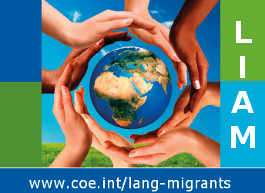Teacher training
Like teachers of any subject, language teachers need to undergo specialised initial or pre-service teacher training before they are asked to take up their teaching duties. This is just as true for those teachers for whom the language in question is their mother tongue as for those for whom it is an additional language. Guidelines for training aimed at future teachers of languages in mainstream European schools are to be found in the European Profile for Language Teaching Education, the result of an EU-funded project, and in the European Portfolio for Student Teachers of Languages that resulted from a Council of Europe ECML project and is intended to help teachers in training to assess their own progress. These documents may be especially useful reference points for when preparing training programmes for those who are working as teachers but have not yet had any formal training in language teaching.
However, generally such initial training does not cover the special demands made of teachers who work on language courses for adult migrants. Moreover, some teachers of migrants working for community associations and charitable organisations, or as volunteers, may not have had any training at all as language teachers. In such cases, additional training is needed to equip language teachers to teach migrants effectively. Bearing in mind Council of Europe principles, specific areas that may need to be addressed in further teacher training are likely to include, among other topics:
- The social, psychological, educational and language background of typical migrants
- Their likely situation and real-life needs in the host community
- Intercultural issues, including diversity and racism
- Plurilingualism, pluriculturalism,
- The role of the CEFR descriptors and principles in the teaching and assessment of adult migrants
- Learning materials and teaching approaches suitable for adult migrants
Ways of providing further, specialised teacher training for teachers of adult migrants
Further training for teachers of adult migrants may take any or a combination of the following forms:
- an induction course at the beginning of their employment as teachers of migrants – this is usually short and focused on practicalities such as the typical education and language background of migrants in the locality in question, how to assess the needs of these migrants, what kinds of learning materials to use, and how to motivate learners facing practical, social and psychological challenges in the world outside the classroom;
- an in-service training course in the specific field of migrant language training – the course may be part-time alongside practical ‘on the job’ experience, which could usefully be drawn on in assignments and for practical assessments. Issues that need special attention in in-service training for teachers of migrants include the handling of cultural aspects of language teaching for those who come from different educational traditions; dealing with low levels of literacy; relating the language syllabus to the migrant students’ everyday practical needs, and assessing migrant learners’ progress. Specialised programmes have been developed in some member states for ‘retraining’ language teachers so that they are formally qualified also to teach migrants.
- Workshops led by experienced teachers of migrants and specialists in the field – many employers realise the value of offering teachers the chance regularly to exchange expertise and collaborate in exploring challenging areas at the workplace or, less regularly, at relevant external events and conferences.
- Mentoring by a more experienced colleague – this may include team-teaching, in which the two teachers plan and jointly teach certain lessons, and peer-observation, during which they observe each other and comment or seek clarification on what they have observed.
The importance of continuous professional development
All such options may be seen as part of professional development, the process by which individual teachers, however experienced they are, continue to broaden and deepen their expertise and their knowledge-base in the specific kind of language education that adult migrants need. Professional development can also include any activities in the professional field which are felt to be useful and important to the individual, such as taking on new teaching and non-teaching duties, learning one or more migrant languages, guided reading, counselling students and surveying their views, and classroom-based research. While it is best self-directed, individualised professional development nevertheless requires guidance and financial support, as well as recognition, from the employer.
RR
Related resources
- Quality assurance in the provision of language education and training for adult migrants – Guidelines and options, 2008, Richard Rossner
EN FR
- The linguistic integration of adult migrants and the ‘Common European Framework of Reference for Languages’, 2012, David Little
EN FR
- Providers of courses for adult migrants- Self-assessment Handbook, 2012, Richard Rossner
EN FR IT SL
- The ‘Common European Framework of Reference for Languages’ and the development of policies for the integration of adult migrants, 2008, David Little
EN FR
- The role of literacy in the acculturation process of migrants, 2008, Hervé Adami
EN FR



